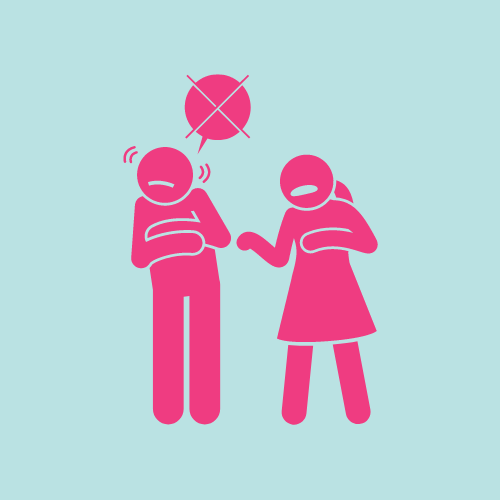Student Conduct & Community Standards (SCCS) recognizes that conflict is a necessary and normal part of life. At the University of Tennessee, Knoxville, students are a part of a large community with differing values, opinions, beliefs, and behaviors.
Sometimes our interactions with values or opinions that differ from our own can lead to disagreements. Although conflict is uncomfortable – and tends to hold negative connotations – it can be a powerful opportunity for the involved parties to grow and learn from one another. Conflict resolution isn’t a natural talent; it’s a life skill that we practice and improve over time. While different perspectives can lead to disagreements, conflict can be a healthy part of the learning experience when approached appropriately and respectfully.
Conflict Styles
Knowing that individuals tend to approach conflict in certain ways is helpful in understanding others and navigating conflict. SCCS offers a Conflict Styles Assessment to help students learn about their own conflict style. Please see the Conflict Resolution Resources below for more information about the Conflict Styles Assessment.
In order to create a healthier, more productive experience when navigating conflict, consider the following tips:
- Respect the other person’s human dignity, even when you disagree with their ideas.
- Look below the surface. Ask yourself, “What do we each want from this situation? And why do we want it?”
- What you mean to say isn’t always what the other person hears. Take responsibility for the intent and the impact of your words.
- If you (or the other party) start to feel overwhelmed, ask for a time out. Agree to return to the conversation after a break.
You might be surprised by the possibilities that can emerge from a thoughtfully managed conflict such as better solutions to problems, clarified values, firmer boundaries, improved communication, and ultimately deeper relationships.
Accommodators have a harmonizing approach to conflict. They often focus on  supporting others in a conflict situation and are adept at placating people in uncomfortable situations. Accommodators often gain strong appreciation from others involved in a conflict.
supporting others in a conflict situation and are adept at placating people in uncomfortable situations. Accommodators often gain strong appreciation from others involved in a conflict.
Weaknesses: Accommodators may build up resentment from denying their own needs. It also may be difficult for those who want to get to the root of the problem to work with accommodators who tend to focus on making others happy.
In resolving conflict, accommodators tend to have a low concern for oneself and a high concern for others, as illustrated in the graph at the bottom of the webpage.
Avoiders tend to step away from conflict. They often keep their opinions to  themselves in conflict situations so as not to continue or escalate the conflict. They are often admired for having a calming, quiet presence in the face of crisis.
themselves in conflict situations so as not to continue or escalate the conflict. They are often admired for having a calming, quiet presence in the face of crisis.
Weaknesses: Avoiders sometimes keep their feelings bottled up and then aren’t able to meet their own needs. This can result in a frustrating buildup of emotions.
Avoiders tend to show a low concern for oneself and a low concern for others in resolving conflict. This can be see in the graph at the bottom of the webpage.
Competers are known for being persuasive and direct. They know the result they  want in a conflict situation, and they go for it. Their strengths are that they are often passionate about their views and dedicated to pursuing their convictions. Competers are good at making quick decisions, and tend not to waste time, which is especially helpful in the time of crisis.
want in a conflict situation, and they go for it. Their strengths are that they are often passionate about their views and dedicated to pursuing their convictions. Competers are good at making quick decisions, and tend not to waste time, which is especially helpful in the time of crisis.
Weaknesses: Sometimes competers wind up with unequal relationships with others, and feelings of others can be hurt or overlooked with their decision-making style.
Competers tend to have a high concern for oneself and a low concern for others in conflict resolution. This can be seen in the graph at the bottom of the webpage.
Compromisers approach conflict with the goal of compromise. They tend to think  about what they are willing to give up and what they are willing to hold on to, and try to gear communication to focus on this give and take for all parties. It is a good way to promote cooperation. It can be done fairly quickly when both parties are engaged.
about what they are willing to give up and what they are willing to hold on to, and try to gear communication to focus on this give and take for all parties. It is a good way to promote cooperation. It can be done fairly quickly when both parties are engaged.
Compromisers tend to have an equal amount of concern for others and oneself in resolving conflict. The healthy amount of concern places compromisers at the middle of the graph seen at the bottom of the webpage.
Collaborators and problem solvers tend to want to discuss all the details of a  problem and work through it together so that everyone gets what he or she wants and is happy in the end. Their strengths are that they tend to welcome differences, build high-levels of trust and mutual understanding in relationships. There is also the potential to learn from creative collaboration.
problem and work through it together so that everyone gets what he or she wants and is happy in the end. Their strengths are that they tend to welcome differences, build high-levels of trust and mutual understanding in relationships. There is also the potential to learn from creative collaboration.
Weaknesses: When time is a factor, it is difficult to spend the energy and time needed to process the way collaborators tend do. There is also the potential for burnout from over-processing.
Collaborators have a high concern for oneself and a high concern for others in resolving conflict, as illustrated on the graph at the bottom of the webpage.
Conflict Resolution Resources
Student Conduct & Community Standards (SCCS) offers resources to assist in conflict resolution. These resources can help you better understand yourself and others to engage in conflict in a healthy and productive manner. Each of these resources may be issued by SCCS, but access to and additional information about these resources may also be requested by emailing studentconduct@utk.edu.
The Conflict Styles Assessment is an online tool developed by SCCS that identifies a person’s preferred approach to conflict. Familiarity with the five conflict styles allows students to understand their options for more effectively managing conflict with others. Each style works well in different contexts and has its own advantages and limitations. By increasing awareness of their own conflict style and being able to identify the styles of those with whom they are in conflict, students are better prepared to pursue a mutually agreeable process and outcome for all involved parties.
Finding Common Ground is an online empathy training course in Canvas. This  program is intended to help students understand and increase empathy toward themselves and others, especially toward those who are different from oneself. Empathy is expressed outwardly through both word and action, but it is also personal. The goal of this course is to provide students with practical information about empathy—what students do with that information is completely their choice.
program is intended to help students understand and increase empathy toward themselves and others, especially toward those who are different from oneself. Empathy is expressed outwardly through both word and action, but it is also personal. The goal of this course is to provide students with practical information about empathy—what students do with that information is completely their choice.
A No Contact Directive is an administrative, non-punitive action that may be taken by the university. No Contact Directives prohibit a student from having verbal, physical, written, and/or electronic contact with specific other persons for a definite or indefinite period of time. Please see the No Contact Directive page for more information about this resource.
The Office of Ombuds Services generally serves graduate students, faculty, and staff to assist in conflict resolution. Please visit the Office of Ombuds Services website for more information or to schedule an appointment.
For students living in on-campus residence halls, University Housing provides conflict resolution resources (i.e., roommate agreements, etc). Please see the University Housing website, contact your Resident Assistant, or contact your Hall Director for more information.
VolsGrow is a Canvas Catalog course created by SCCS to help students develop and restore dignity in themselves and their relationships. VolsGrow was developed with the guidance of Dr. Donna Hicks, an expert in the field of dignity. VolsGrow teaches students the value of dignity and increases their awareness of its important role in their everyday lives.
Vols Resolve is a Canvas Catalog course created by SCCS that focuses on civility, conflict management, and emotional regulation. The course provides opportunities for self-reflection and skill-building to help students learn healthier, more productive ways of engaging with conflict and emotions.
SCCS staff are available to facilitate conflict-related workshops tailored specifically for your class, student staff, or campus organization. Sample topics include de-escalation techniques, active listening skills, conflict styles, and conflict resolution strategies. Please fill out this form to request a workshop.

